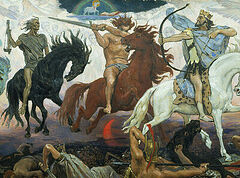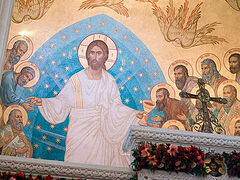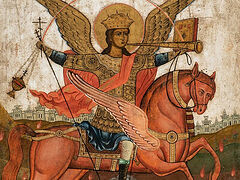The angel of the Church of Smyrna
We continue reading the book of Revelation. We’re now analyzing the second chapter. We stopped on verse 8. Last time we saw that this majestic vision of Christ’s coming was revealed to the Apostle John on the Lord’s Day, on Sunday, on Patmos. Christ appeared to him sitting on a throne, surrounded by all that we described last time. St. John saw Him amidst seven golden lampstands, seven stars, and seven angels. The angels of the Churches are the bishops of the Churches. Christ first addressed the Bishop of the Church of Ephesus, the angel of the Church of Ephesus. He says He knows about his labors, about his patience, He sees his labors, but despite this, God also sees something that burdens his soul—that he has left his first love. He says to him: Remember therefore from whence thou art fallen, and repent, and do the first works (Rev. 2:5), otherwise his lampstand would be shaken and temptation and trials would come.
 The angels of the seven Churches, Apocalypse Tapestry, 14th c.
The angels of the seven Churches, Apocalypse Tapestry, 14th c.
To the second angel, of the Church of Smyrna (to the bishop), Christ says: And unto the angel of the Church in Smyrna write; These things saith the first and the last, Which was dead, and is alive (Rev. 2:8). We have already spoken about how this wording with “saith” is like the prophetic expression “thus saith” used by the prophets of the Old Testament when they proclaimed the will and word of God to the world. Only God can say in Holy Scripture, “Thus saith the Lord.” Thus, God says the following: He is the First and the Last, the Beginning and the End. Nothing exists outside of Him; in Him is everything. He is the Beginning and End of all things. Which was dead, and is alive—Who was put to death but nevertheless came back to life and remains forever. He talks about this because later he will begin talking about the trials yet to be faced.
In verse 9, Christ continues: I know thy works, and tribulation, and poverty, (but thou art rich) and I know the blasphemy of them which say they are Jews, and are not, but are the synagogue of Satan (Rev. 2:9). I know your good deeds and the difficulties you’re going through; and I know your poverty. You know, it’s important: God knows about our lives. Because that’s what matters in the end. What can someone else know about us? Only what he sees from the outside. So? If we tell him something else about ourselves, he’ll know a little bit more. But despite his good disposition, his efforts, our familiarity will hit a certain limit. Human capabilities are very limited. But God knows everything. And when we face difficulties and problems in our lives, it’s important to remember that God knows about all this, and then we’ll have peace within us. It’s important to remember that God knows the truth and the real meaning of what’s happening; He knows about my difficulties. People may not know and not remember me, not accept my words, but God knows; He knows the reality, so we shouldn’t be disappointed, shouldn’t suffocate, or panic, or throw a tantrum because other people don’t understand us. Let them not understand. It’s impossible for other people to understand us, especially for everyone to understand us. When God came to earth, the perfect God, He spoke and acted divinely; all of His deeds and words were perfect, but people didn’t accept Him. Is it really possible to be accepted when we turn everything upside down because of every little thing? However, God knows our human flaws, but he also knows our hearts. He knows our deeds, our sorrows, our difficulties. We have talked about how the word “tribulations” is a strong word, describing exhaustion, weariness, longing. God also knows our poverty.
Here, in this verse, it’s not talking about spiritual poverty. This bishop wasn’t spiritually poor, as described below. Here it’s talking about material poverty. He was poor; the Church there was very poor. The early years of the Church, the persecution… Some people say: “And why does the Church need money?” Okay, it doesn’t need it, but you don’t need it either. You also can live on a piece of bread a day; you won’t die. But if you need to build a house or something else, then you’ll need to have money. So the Church sometimes needs to do some things, and so it needs money. If it doesn’t have money, it won’t be able to do it. If it doesn’t, the world won’t collapse. But this is really one of the difficulties. The Lord says to the bishop: “I know about your poverty, but you’re rich. Despite the fact that you’re in material poverty, you’re rich.” And then the Lord explains why he’s rich.
It can happen that a man is both poor and rich at the same time. There can also be the opposite situation, when a man is very rich, but at the same time he’s immensely poor: When he’s swimming in millions, but at the same time unhappy, stingy, greedy—then he’s poor, naked, and exhausted. He’s neither happy with money (he’s stingy, and so he gets no pleasure from it) nor does he have the Kingdom of Heaven, because he doesn’t use money with spiritual reasoning. He thinks he’ll take it with him. Why does God call the Bishop of the Church of Smyrna rich? He’s beset, condemned, fought against—the blasphemy of them which say they are Jews, and are not, but are the synagogue of Satan. The Jews believed they were the chosen people of God. But the chosen people of God aren’t those who descended from Israel and have a hereditary, genealogical connection with it, but those who do the works of God. A Christian is more than a person who is baptized, goes to church, who keeps some rule according to the typikon. He is someone who has Christ within himself, who lives by the grace of God. The Jews were the people of God. The crucifixion of Christ severed their connection with God. They crossed over to the other side themselves, shaking off this Divine blessing from themselves. Now the chosen people are no longer the Jews, or the Greeks, or any other people, but the Church, which is beyond the bounds of nationality or family, and which embraces the entire world. Christians, the children of the Church, are the people of God.
“A rebellion against you has been started by those who call themselves Jews, but who are not, but rather a satanic assembly.” You see, in Revelation, Christ speaks descriptively, using periphrases. He doesn’t speak vaguely, politely, as we would, but He speaks about things as they are. He says: “It’s not an assembly of God’s people, but an assembly of satan.” Why? Because they do the works of Satan; they have Satan within them. Because these are people who have betrayed themselves to Satan and act against God. When we hear such conversations, let us not be taken in by false politeness. Sometimes we need to speak the truth, and not play false love by adding syrup everywhere. Everyone is good, everyone should be loved. Of course, everything is fine, wonderful, and holy, but there are also some truths. When God speaks of truth, it doesn’t mean that He insults a man. He doesn’t speak for the purpose of insulting, of shooting lightning at someone, or condemning him, but for the purpose of waking him up. God says such things to make people come to their senses. Christ speaks in such a way so as to convey to this bishop a true understanding of things, so he wouldn’t start wondering: “Maybe there’s some kind of compromise? Maybe I should give in on something, discuss some issues?” No, it’s an assembly of satan. There is no compromise.
In verse 10, Christ continues: Fear none of those things which thou shalt suffer. Fear nothing. You still have much to endure (meaning the bishop of those who make up the satanic assembly), but fear nothing. The Lord doesn’t say this because he’ll escape sufferings—no. He’ll suffer. This bishop is Polycarp. At the time that the Apostle John wrote this epistle, the bishop in Smyrna was St. Polycarp, whose memory we celebrate, and whose life ended with a martyr’s crown. He was killed, burned; he ended his life in torments. Christ doesn’t say He'll help him avoid this—no. He doesn’t say: “Don’t be afraid, they won’t do anything to you. I’ll save you from them.” Rather, He says: “Don’t be afraid of what’s going to happen. You’ll endure all of this. You won’t manage to avoid anything. They’ll burn you alive.” Bishop Polycarp was indeed burned alive. God doesn’t deliver him from torment, but tells him not to be afraid, but to endure. Why?
Further, we read: Behold, the devil shall cast some of you into prison, that ye may be tried; and ye shall have tribulation ten days: be thou faithful unto death, and I will give thee a crown of life (Rev. 2:10). Satan is planning to take some of you and put you in prison; he will tempt you; you will endure many trials in prison and will have great tribulation that will last ten days. We don’t know for sure if the torments lasted for ten days, but most likely the Lord speaks of ten days to show that this period of trials will continue for a certain time—it won’t be forever. And then what? Be thou faithful unto death, and I will give thee a crown of life. “No matter what, remain faithful unto death, and I will give you a crown of life.” It doesn’t mean that you have to be faithful only unto death. You have to remain faithful even if death threatens you, until death, and God will give you a crown of life. This is the message Christ leaves for the Bishop of Smyrna: “Remain faithful. Don’t be afraid. Don’t give in to cowardice.” And indeed, he remained faithful, and accepted death in torments in deep old age, like St. Voukolos, whom we spoke about before—the Bishop of Ephesus. He also suffered and received a crown of life.
There was an old monk on the Holy Mountain where we lived, in New Skete. He lived in a cave; his name was Averkios. He was very simple, illiterate; he lived in complete poverty in his cave. When he would come to our skete church for Vigil or Liturgy, he always sat behind everyone, taking the very last stasidia. What kind of work did he do? He gathered wild grass in the desert. There was little soil there—it’s mostly rocky, but little grass grew, and it was very valuable for the fathers.1 And he collected snails. He sold them to the fathers for a little money, so he would have a little something to feed himself with. This Elder Averkios, very virtuous, poor, living in a cave, was standing in his spot in the darkness at the end of the church during Vigil once, when only the lampadas were burning. He unexpectedly got up from his seat and headed straight for the altar, to the altar table. The fathers were very agitated. Only priests go there—ordinary monks don’t go into the altar. What happened? Did he go crazy? They saw him go in, make a prostration, and start talking with someone. Then he came back out, and the fathers stopped him, asking him what happened and why he went into the altar in the middle of the service. He replied:
“Nothing happened. The bishop called me.”
“What bishop called you? Did you see some bishop here?”
“What, didn’t you see the bishop who was here in church?”
“We didn’t see any bishop.”
“He came into the church, called for me, and I went in. I prostrated to him and kissed his hand. He asked my name. I said, ‘Monk Averkios, Your Grace.’ He took and wrote my name on a board.2 He showed me the board and asked if I saw my name. I said, ‘I see it, Your Grace.’ ‘What’s written here?’ ‘Monk Averkios.’ ‘I have written your name in the Book of the Living.’”
The next day, Fr. Averkios reposed. He left with that message.
So, to whoever remains faithful to death, Christ will give the crown of life. And that’s the most important thing for us—to have the crown of life. All the rest is vanity. Collect as much as you want of whatever you want. Do what you want. But if you depart from this world without having the crown of life, then you’re pitiful, poor, and ill-fated. And if you have the crown of life, you have this blessing of God, the notification that you’ve defeated death, that you’ve overcome it and that you’ll be with God eternally. Then you haven’t lost in your life. All the difficulties and trials that you’ve overcome have their reward in the Kingdom of God. At the same time, we must know that our faith doesn’t depend on favorable circumstances and convenient situations: I don’t believe only when things are good for me and when I want everything to work out well. We often sin this way.
As soon as something starts going wrong, we immediately take offense at God. We blame God for everything. Understandably, we’re weak people, we have our difficulties. But if you don’t decide for yourself that you’ll remain faithful to death, then you’ll start grumbling at the smallest thing that comes your way. Then, with every little thing you’ll start saying, “Oh, I can’t; it’s too hard for me,” and so on. And if you say to yourself from the very beginning: “I will remain unto death. I won’t back down. I’ll die, but I won’t back down,” then anything that happens to you before death will seem easy. You’ll say, “I haven’t died from it yet.” They may have slandered, condemned, imprisoned, or driven you out, but they haven’t killed you yet. You need the determination to stand unto the very death. That means that we must remain faithful until the end of our lives and must be ready to suffer for our faith.






